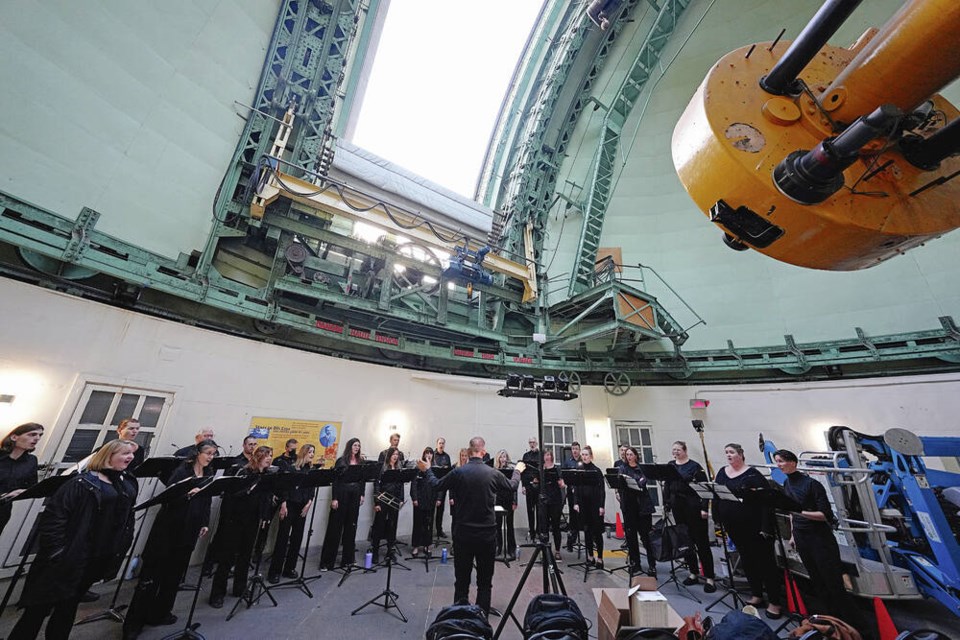VOX IN THE STARS
Where: Dominion Astrophysical Observatory, 5071 W Saanich Rd.
When: Sept. 13-15
Tickets: Sold out
Musical performances inside the Dominion Astrophysical Observatory are not regular occurrences, for obvious reasons.
The designated National Historical Site on West Saanich Road was built to house two research telescopes, which makes public access somewhat limited due to the nature of the work performed therein.
In that sense, the Vox Humana Chamber Choir has made a popular series of celestially-inspired choral concerts, Vox in the Stars, an unlikely tradition of sorts. And for that, the choir’s artistic director, David Stratkauskas, is — wait for it — over the moon to be on the receiving end of such goodwill. “It gets used all the time for science, which is its main purpose,” he said. “But we’re delighted they make space for us to do this, in terms of their schedule.”
The series resumes tonight with the first of three consecutive sold-out performances, all within the observatory’s historic Plaskett Telescope dome. Fittingly, the 24-member choir will perform near dusk under the stars. With capacity for an audience of just under 100 people, the event will be at capacity all three nights this weekend.
“It’s such a marvellous space,” Stratkauskas said. “And there’s so much music that very directly explores themes of the stars, cosmos, and space, but also the bigger feelings around that.”
Performances at the site make sense acoustically and aesthetically, Stratkauskas said. “Thematically, it’s the equivalent of sacred music sung in a sacred place. Music about the cosmos, stars, science and the bigness of everything sung in this very special and historic observatory. Acoustically, it’s a very resonant space. It’s like one of those great old cathedrals in Europe. It’s very well suited to the mood and choral music in general.”
Vox in the Stars was created in 2011 by the choir’s former music director, Brian Wismath, and has become a signature event for Vox Humana, whose repertoire this week includes works by British composer Kerry Andrew, among others.
The event features the world premiere of Dawn Bends, by Victoria’s Nicholas Fairbank, who based his a cappella rendering on text by U.K. visual artist Zsuzsanna Ardó. The piece (which touches on everything from climate change to weather) was written for Ardó’s PlanetWoman project, a series of artworks, exhibitions and art installations — synchronicity that was too easy to ignore, Stratkauskas said.
Dawn Bends is perfectly suited to an evening of music performed on a site dubbed, fittingly, “the Centre of the Universe,” Stratkauskas said. “The text includes the phrase, ‘Gravity dances,” so it ‘s very on-point.”
Vox in the Stars also includes two pieces that explore the role of women in science: Girl Hours, by Edmonton composer Stuart Beach, is based on the life of Henrietta Swan Leavitt, an influential American astronomer who discovered ways to measure the distances of stars, while An Account of a Comet, by Michigan-based composer Sarah Rimkus, was inspired by Caroline Herschel, one of the first women to be paid for her work as a scientist.
“Science and astronomy were very much a man’s game, in the past, and these are perspectives of some pioneering female scientists and astronomers,” Stratkauskas said.
The showstopper is liable to come during performance of Thou My Soul My Set in Darkness, a piece written by Toronto composer Kathleen Allen that has been performed at previous iterations of Vox in the Stars. It never fails to generate a sense of wonder, Stratkauskas said. “She wrote it for singing in the Dominion Astrophysical Observatory in such a way that the piece is timed” to operation of the telescope.
“We can rotate the dome and have it open so that the sky visible. Even the noises the dome makes as it rotates and squeaks are in the key of the piece. It’s all designed to go together.”



